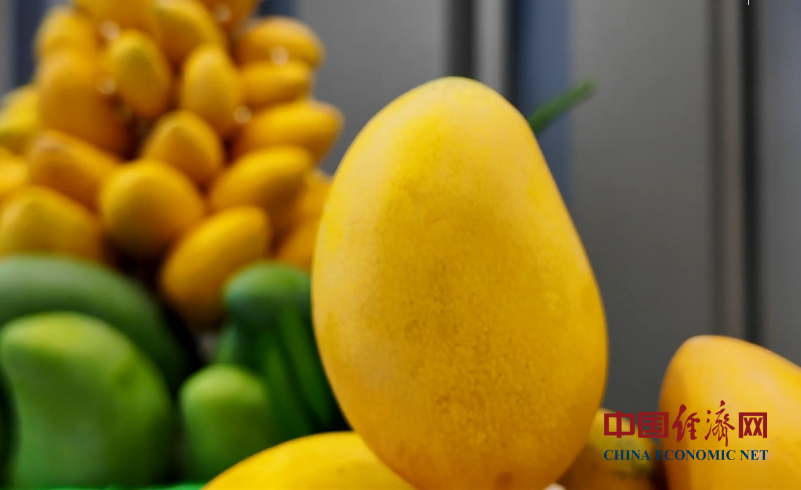by Wang Kai

Pakistani mangoes displayed at Mango Fest hosted by Pakistani Embassy in China on August 13, 2025 [Photo/China Economic Net]
Pakistan, the world's sixth-largest mango exporter, boasts over 200 varieties yet struggles to translate its abundance into export growth. With around 1.2 million tonnes of mangoes produced annually over the past several years, the country still exports only about 10% of its produce. High production costs and persistent quality concerns continue to constrain growth.
From Tree to Table: Adding Value
Khawar Nadeem, manager of the Pakistan Horticulture Development & Export Board, highlights that up to 30% of mangoes are lost from orchard to consumer due to outdated farming practices. Unlike conventional Pakistani farms with 40–60 plants per acre, countries like Australia and Egypt cultivate up to 600 plants per acre using high-density planting, superior rootstocks, and greenhouse setups. "If orchards with modern technology can be established, yields could multiply," Nadeem says.
"For that, we need greater adoption of genetic engineering and the establishment of comprehensive production facilities, such as greenhouses, to offset the declining quality of nurseries caused by contamination from germs, diseases, and pests. At the same time, it is essential to introduce dwarf rootstock varieties that offer better adaptability to Pakistan's soil conditions," he added.
Dr. Muhammad Zubair Iqbal, Vice Chancellor of Bahauddin Zakariya University, points to another barrier: costs. "Electricity, gas, land, and registration fees are all too high. If we really want this industry to grow, input costs must come down and registration processes should be eased."
Beyond production, Dr. Iqbal highlights chronic quality issues. He calls for government-backed standards to ensure only premium fruit enters the export chain. "Pakistan's mango sector remains largely raw-fruit focused, missing out on lucrative value-added opportunities. Juicing units, drying plants, packaging facilities, and industry training are essential. A full supply chain must connect producing regions with export ports."
"Pakistan's mango sector remains largely raw-fruit focused, missing out on lucrative value-added opportunities.A proper supply chain is essential. Juicing units, drying plants, packaging facilities, and industry training can dramatically enhance both quality and profitability." Dr. Iqbal said, A whole supply chain should be put in place from mango producing-regions in the country to ports.
Nadeem agrees, emphasizing the need for pulping, dehydration, and freeze-drying facilities. Neighboring countries, he notes, convert as much as 70% of production into pulp. "Exports could be conveniently tripled provided we move up the value chain," he envisions.
A Sino-Sweet Partnership
In May, the All Pakistan Fruit & Vegetable Exporters, Importers & Merchants Association (PFVA) launched its 2025 mango export season, setting a target of 125,000 tonnes worth an estimated $100 million.
China, the world's largest fruit consumer, has emerged as one of Pakistan's fastest-growing markets. In 2023, Pakistan's mango exports to China exceeded 115,000 tonnes with a trade value of $80 million. Pakistan's Ambassador to China Khalil Hashmi told China Economic Net that the country aims to double exports to China within five years.
The results of bilateral cooperation are already visible. Cold-chain logistics have cut transit times by 50% and reduced spoilage rates. Chinese technologies in preservation and processing are helping raise value-added returns. On e-commerce platforms such as JD.com and Pinduoduo, daily peak sales exceeded 50 tonnes, with satisfaction rates above 98%, according to Zhang Qingfeng, Vice President of the China Fruit Marketing Association.
Dr. Iqbal sees further potential in Chinese equipment. "We need compact units with storage capacity, boilers, and vacuum-sealed systems to maintain hygiene and shelf life. Harvesting machinery, whether imported or locally produced, could also raise efficiency. Pakistan still lacks packaging facilities of international standard."
Muhammad Riaz, President of Al Rafique Enterprises in Punjab, advocates more virtual meetings between bilateral trade bodies, Chinese corporate visits to Pakistan, and greater showcasing of processed mango products on the world stage.
Academic collaboration is also taken into account: Dr. Abid Ali, Professor at Shenyang Normal University, suggests joint research on pest management, precision pesticide use, and green plant protection to reduce environmental impact.
Looking ahead, Zhang argues that a three-pronged approach could transform Pakistan's mango exports: aligning phytosanitary standards with China to ease customs and double exports within three years; attracting Chinese investment into mango industrial parks to co-develop new transport-friendly varieties such as the "mini Chaunsa"; and building stronger brand linkages by including Pakistani mangoes in China's "Belt and Road Premium Agricultural Products" list, complementing Hainan's mango season to ensure year-round supply.
(Editor: liaoyifan )


